Manchester United: Ole Gunnar Solskjaer's wrestling past & formative years
- Published
- comments

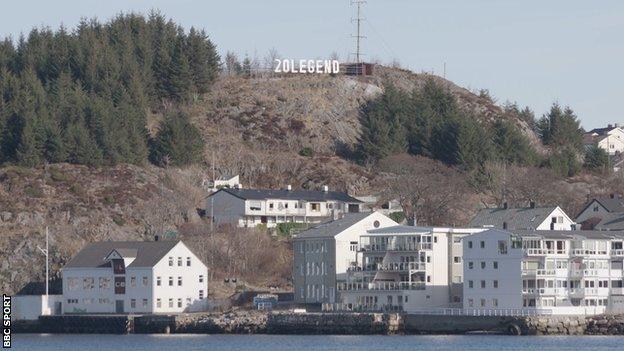
The sign in Kristiansund was first changed in December
On the outskirts of a small Norwegian city, population 25,000, there is a sign looking down from the top of a hillside, Hollywood style.
It once read 'KRISTIANSUND'. That is the name of this old fishing and timber town, surrounded by sea and fjords, now also shaped by oil and natural gas reserves off the coast.
This is where Manchester United manager Ole Gunnar Solskjaer was born and raised.
On the day BBC Sport visited, it spelled '20LEGEND', referencing Solskjaer's old United shirt number and the special place he has among the club's fans. It symbolises the sense of pride felt here for their "boy next door", who grew up to be "the most popular man in Norway".
BBC Sport travelled to Kristiansund as part of a special feature to be broadcast on Football Focus on BBC One at 12:00 BST on Saturday, 13 April.
So just how has Solskjaer's home town influenced him? And what about his impact on the place where he grew up?
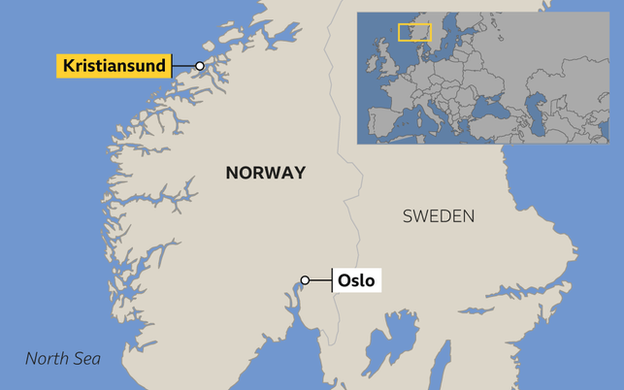
The famous wrestler
Tore Lovikis director of the Kristiansund Atletklubb, a wrestling club in Kristiansund founded in 1939.
Ole Gunnar's father Oivind was six times the wrestling champion of Norway. He should have got a cup for that but because he lived so far out in the sticks he didn't get it. He competed in the European and world championships as well.
Oivind has his own wrestling move named after him - it's one that he developed himself and that's very difficult to beat. It's an intelligent move, one that people never expect to happen. They would always be expecting one thing and he would do this something else. It's a big a reason why he won so many championships.
Ole Gunnar himself wrestled for two years - between the ages of eight and 10. He was not really very good - not as good as he was at football - but he was a big part of that world and with his dad would go training, running up and down the highest mountain in the area, which is about 830m high. Up and down.
Wrestling is a great sport for building up character, you learn how to take a hit, and it helps ground people. Ole Gunnar's dad would tell him he must always train his weaknesses. In wrestling you must very much focus on that - improving what you are worst at, to make yourself a better person all round.
So Ole Gunnar would train a lot his weaker foot but maybe he also learned from wrestling that in football he doesn't have to go down as easily, and that he has the strength to be out there on his own in the middle.
The whole of Kristiansund is very proud of him. And we're very glad that he was a better football player than he was a wrestler.

The sign in Kristiansund was first changed in December
The boy next door
John Marius Dybvik is chairman of Clausenengen FK, Solskjaer's first club, who now play in the lower regional amateur leagues.
He trained a lot. He was not satisfied only going to organised training. He also trained by himself. He was highly motivated as well as extremely talented.
Ole Gunnar always looked very young, hence his nickname, the baby-faced assassin, and he played at our senior level from 1990 when he was 17. He scored lots of goals for this club. We were already proud when he left for Molde in 1994 and then even more so when he joined Manchester United two years later - it was tremendous.
When he came back after playing for United everyone was a bit star-struck. He is by far the most popular and well known Norwegian, but he is also like the boy next door.
The day before he left for Manchester United to become temporary manager in December he was training our girls' under-17 side and speaking to them as friends. So it's quite strange what happened next.
We had heard on the news he might get the call and there was speculation but he didn't say anything. We were making fun of it: 'Are you leaving the girls under-17s for Manchester United?'
And then he did! The players and all the kids were going wild.
The young leader
Arild Stavrum was Solskjaer's team-mate at local club Clausenengen, where they both started their careers in the Norwegian fourth tier, joining in 1990. They then played again together at Norwegian top-flight side Molde, whom Solskjaer joined in 1994. Two years later, Solskjaer signed for United for £1.5m. Stavrum went on to play for Aberdeen and Besiktas.
We grew up about 500m from each other and as kids we played football together all the time. From the age of about 10 years old we were always fighting for the local championship against another team from Kristiansund - it felt like the biggest derby in the world. They were always such even games - we won one, they won one.
One match I remember waking up looking up at Ole Gunnar and the rest of the team, I'd been knocked out. It was really tough, but that kind of rivalry, it made us footballers.
It's hard to say at that age somebody is going to be a leader of men. You have to have experience and grow into such a role. But even when he was very young Ole Gunnar always had an understanding of the game.
He was technical, really quick, he could shoot - you could see parts of what he would become but he was a bit small for his age in the early years so he was maybe pushed around a little bit. Then he suddenly grew into it, and we all really saw what a talent he was.
You rarely saw him use more than two touches, that was his big skill. Then there was his finishing, down into the corner and away from the keeper, every time.
Plus his understanding of the game. He is a smart guy and he has become much more mature and he is even more of a leader now. When you are kids it's more intuitive, but this kind of changes at the end of your career.
Everyone always learns a lot from their managers - good and bad - because you can also decide what not to do. The first ones we had in Clausenengen were really good, then at Molde our manager was Age Hareide, the manager of Denmark now, and then Ole Gunnar also had Sir Alex Ferguson. He had a great education.
The role model
Christian Michelsen is Kristiansund BK manager. Kristiansund used to have only two teams - Kristiansund FK and Clausenengen FK. In 2003 they decided to come together and form a new third club - with the aim of breaking into the country's highest division - while continuing to play in the lower leagues themselves. Kristiansund BK started in the third tier and reached the top flight Eliteserien in 2017, where they still compete.
It's a bit embarrassing. I'm one of the many kids who really looked up to Ole Gunnar growing up. He is only a few years older but for me as a little boy he was kind of a role model. Everyone admired him because of his natural talent and the way he played.
We were forever playing football - in the morning, after school, all day long on the weekends - and he was always including other people, even us younger ones. It was so fantastic playing with the bigger boys and Ole Gunnar.
We used to arrange our own tournaments, and when I was 10 he was around 13 or 14 and he managed my team. That would have been the first time for him. Having the future Manchester United manager in charge, we couldn't do anything but win.
Nothing surprises me with Ole Gunnar. He has been ambitious all his life. For instance, the Champions League goal in 1999. He said he had scored that goal many, many times before, in the park, training alone, thinking about special moments, imagining key moments in matches.
But he has always had his feet on the ground and knows where he comes from. He has respect for everyone - that tells you everything about Ole Gunnar.
He is an intelligent guy, reflective. He knows a lot about everything, and when you talk with him his arguments are always well thought through.
He's a manager who will build a team with everyone fighting for the club. He's always been a team player, always taking care of friends and family.
The family values
Ole Olsen coached Solskjaer both at Clausenengen and Molde. He is now retired.
I met him for the first time when he was nine or 10 years old, at a football school. He caught the eye immediately. He was good with both feet; his technique was magnificent. It looked like he slept with the ball in his bed.
But he was very interested in the tactics too. That is very unusual for a boy of 10 - always asking questions: 'Why that? Why that? Why that?'
He scored a lot of goals every year but he was much smaller than the others and was hammered a bit. We trained a bit his strength and when he came over that, he was pointing only one way.
I trained him until he was 12, and then from 17 to 21 when he was at Molde. Then he went to Manchester United.
He was the best player I had but he was also a very good comrade with the other boys. He was the leader of the gang because of his ability and everyone looked up to him, but he didn't let that go to his head, never. He was very special as a footballer and as a person too.
I've been in football 50 years and I've never seen anything like him, never. He was one in a million.
You can see it now in how he handles the media, and all the big stars - always with a smile, a clap on the shoulder. That is his strength. His feet are planted on the ground. He never takes off.
I'm not surprised by what he has achieved. He always had the ability and I'm very proud of him. The way he is on the pitch and especially off the pitch he is a special guy. That's what you see at Manchester United now.
It comes from family. That's why he is like that. He is the same with everybody, the higher people and the lower people. A smile costs nothing he says, and that is true.
He has already done something with the atmosphere at United, somehow bringing it back to the 1990s. He learned very much from Sir Alex Ferguson, the way he handled it. He is doing much the same now as when he came back to Molde from Cardiff - he implanted United's style and they won the championship.
Sir Alex is like a mentor for Ole Gunnar. He still calls him the boss and always talks very highly of him. It's a long way to go, back to those days, but if anyone can take them there, he can.
The developing manager
Arild Stavrum
Ole Gunnar lived here until he was 21 or something like that. He has a big connection with his childhood town. I also know he has a big connection with Manchester. He's divided between those two places.
He felt like a natural choice for United. It was obvious they needed a change in direction, that before they got big names who had no connection with the club. Then when he started winning games all the time it was no surprise he got the permanent job.
The biggest challenge now for him is to continue to develop. You have to become better and better and better in management - it is a constant battle. For example, Jose Mourinho, who has been a fantastic manager for so many years, from the outside it felt like he just stopped developing.
Everyone in Norway is cheering for Ole Gunnar. There are maybe a few Liverpool fans who might disagree, but 99% are enjoying Manchester United winning and we are proud of being part of that in a small way.
You never know, he might have been a hell of a wrestler, but I think he made the right choice.

You can watch the special feature broadcast on Football Focus on BBC One at 12:00 BST on Saturday, 13 April (except in Scotland).
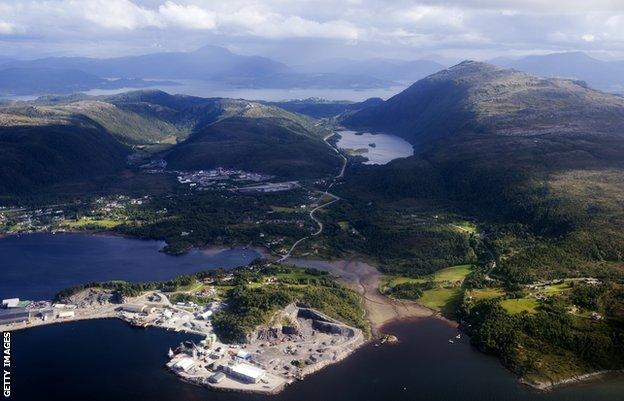
A general view of Kristiansund and its surroundings from the air
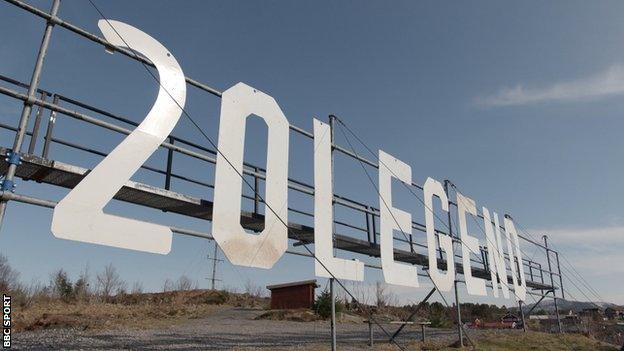
The sign in Kristiansund is often changed to reflect goings-on in the city
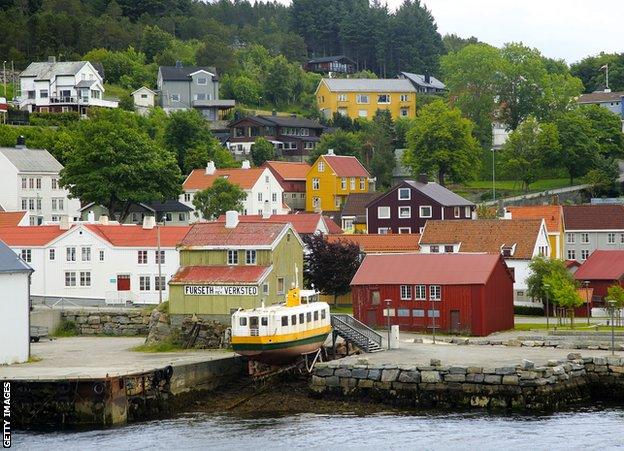
Kristiansund was for many years principally known as a timber-exporting town
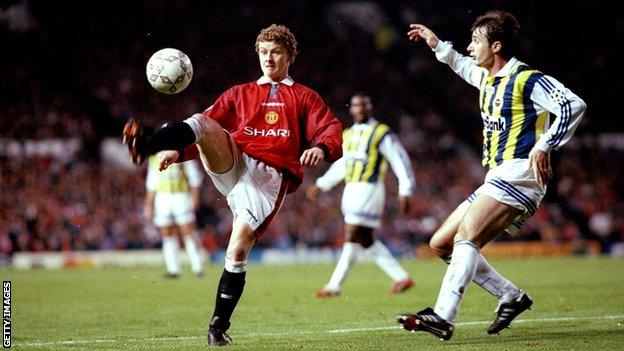
Solskjaer made his debut for Man Utd in the 1996-97 season, joining from Molde for £1.5m in July 1996
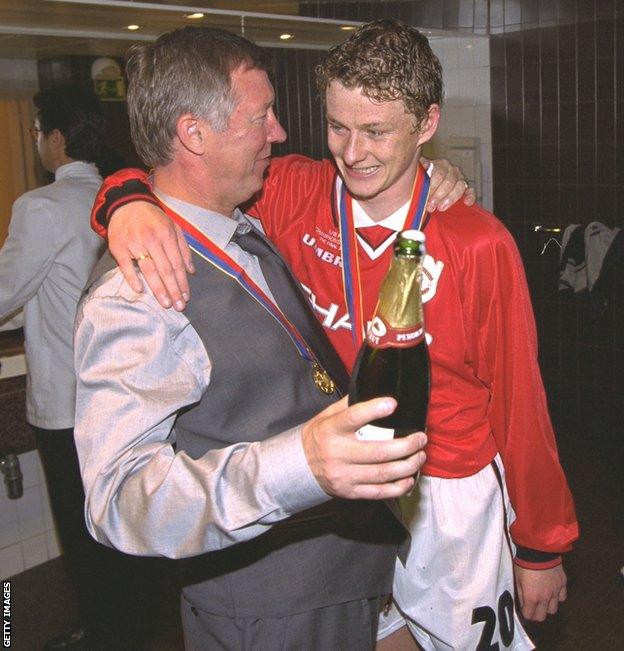
Sir Alex Ferguson and Ole Gunnar Solskjaer celebrate winning the 1999 Champions League
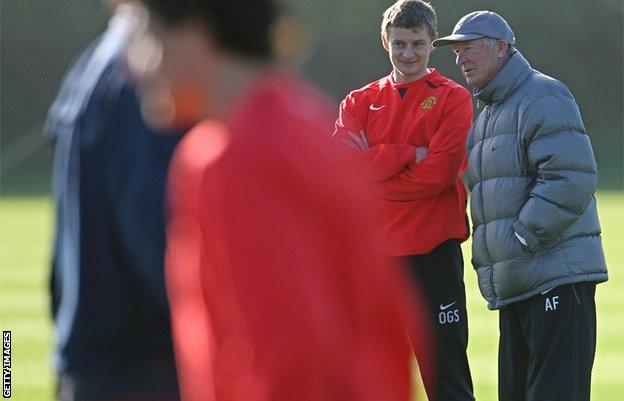
After ending his playing career at United in 2007, Solskjaer managed the club's reserve team between 2008-2011, before joining Molde. With them he won the league title in 2011 and in 2012, and the Norwegian Cup in 2013
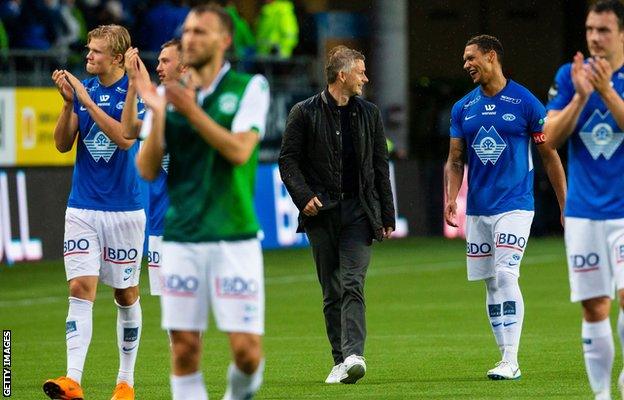
After a nine-month, unsuccessful spell as manager of Cardiff in 2014, Solskjaer returned to Molde in 2015, finishing as league runners-up in 2017 and 2018

Solskjaer played 67 times for Norway, scoring 23 goals. He appeared at the 1998 World Cup and Euro 2000